Related Research Articles
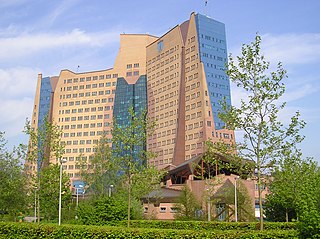
Groningen is the capital city and main municipality of Groningen province in the Netherlands. The capital of the north, Groningen is the largest place as well as the economic and cultural centre of the northern part of the country; as of December 2021, it had 235,287 inhabitants, making it the sixth largest city/municipality in the Netherlands and the second largest outside the Randstad.

The Groninger Museum is an art museum in the city of Groningen in the Netherlands. The museum exhibits modern and contemporary art of local, national, and international artists.
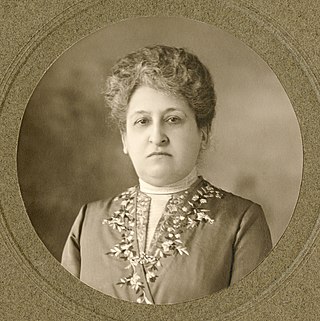
Aletta Henriëtte Jacobs was a Dutch physician and women's suffrage activist. As the first woman officially to attend a Dutch university, she became one of the first female physicians in the Netherlands. In 1882, she founded the world's first birth control clinic and was a leader in both the Dutch and international women's movements. She led campaigns aimed at deregulating prostitution, improving women's working conditions, promoting peace and calling for women's right to vote.

Wilhelmina Drucker was a Dutch politician and writer. One of the first Dutch feminists, she was also known under her pseudonyms Gipsy, Gitano, and E. Prezcier.
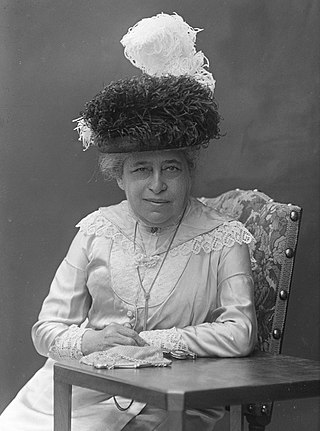
Charlotte Jacobs, was a Dutch feminist and pharmacist. She was the first of her gender in the Netherlands with a degree in pharmacology and also active within the women's movement. She was the sister of Aletta Jacobs.
In the Netherlands, feminism began as part of the first-wave feminism movement during the 19th century. Later, the struggles of second-wave feminism in the Netherlands mirrored developments in the women's rights movement in other Western countries. Women in the Netherlands still have an open discussion about how to improve remaining imbalances and injustices they face as women.
The following is a timeline of the history of the Netherlands' municipality of Groningen.

Catharine van Tussenbroek was a Dutch physician and feminist. She was the second woman to qualify as a physician in the Netherlands and the first physician to confirm evidence of the ovarian type of ectopic pregnancy. A foundation that administers research grants was set up in her name to continue her legacy of empowering women.
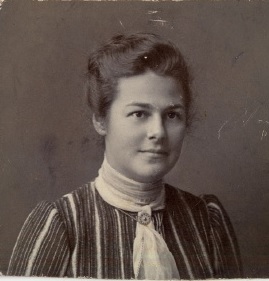
Maria (Mia) Boissevain (1878–1959) was a Dutch malacologist and feminist.
International Archives for the Women's Movement was founded in Amsterdam in 1935, as a repository to collect and preserve the cultural heritage of women and make the documents of the movement available for study. The entire collection was stolen by the Nazis in 1940 and only small portions were recovered after the war. In 1988, the part of the archival collection which had not been looted by the Nazis became the foundational collection of the International Information Centre and Archives for the Women's Movement. A substantial portion of the archive was discovered in Moscow in 1992 and returned to Amsterdam in 2003. In 2013, the institution which houses the collection was renamed as the Atria Institute on Gender Equality and Women's History

Petra Stienen (1965) is a Dutch human rights advocate with more than thirty years’ experience in diplomacy, international relations, civil society, social entrepreneurship and politics.

Mien van Wulfften Palthe was a Dutch feminist and pacifist. As a member of the Vereeniging voor Vrouwenkiesrecht and Women's International League for Peace and Freedom, she strove to secure enfranchisement for women and worked as an advocate for peace.
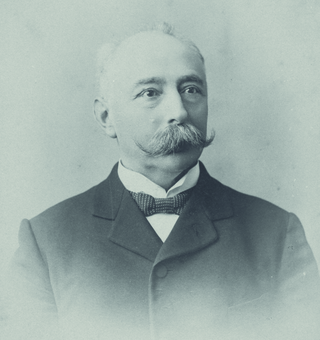
Carel Victor Gerritsen was a Dutch politician known for his radical views. The husband of Aletta Jacobs, he was a proponent of open government, fair wages and birth control. He served as an alderman in Amsterdam and a representative in the States of North Holland. He helped found many radical organisations in the Netherlands including the Nieuw-Malthusiaansche Bond, Radicale Bond and Vrijzinnig-Democratisch Bond.

Bertha "Betsy" Bakker-Nort was a Dutch lawyer and politician who served as a member of the House of Representatives for the Free-thinking Democratic League (VDB) from 1922 to 1942.
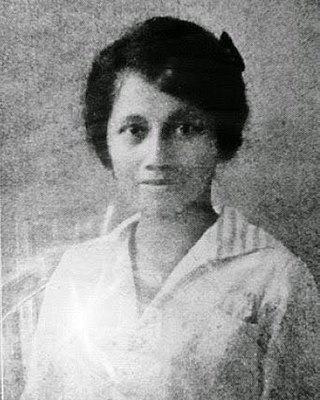
Maria Emilia Thomas, or better known as Marie Thomas, was the first Indonesian woman to become a physician. She received her diploma from the School of Training of Native Physicians in 1922. She went on to specialize in obstetrics and gynaecology and is considered the first Indonesian doctor to specialize in this field. She also established a midwifery school in Bukittinggi.

Nancy Sophie Cornélie "Corry" Tendeloo was a Dutch lawyer, feminist, and politician who served in the House of Representatives for the Free-thinking Democratic League (VDB) from 1945 until 1946 and then for the newly-formed Labour Party (PvdA) until her death in 1956. Born in the Dutch East Indies, Tendeloo studied law at Utrecht University, during which time she made contact with people within the women's rights movement. She became politically active in the 1930's and was elected to the Amsterdam City Council for the VDB in 1938. After World War II, Tendeloo was appointed a member of the House of Representatives for the VDB in the national emergency parliament, formed to rebuild the country and organise elections. In 1946, the VDB merged with other parties into the PvdA, which Tendeloo represented in parliament. She sat on two select committees and spoke in favour of women's rights issues.
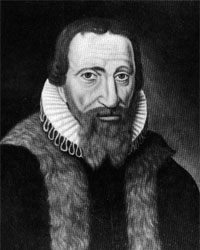
The Canon of Groningen is a list of 40 hallmarks and 52 icons that provides a chronological summary of the history of the city and province of Groningen.
Frederica Johanna "Frederike" van Uildriks was a Dutch educator and botanist, best known for her book Plantenschat (1898) written with Vitus Bruinsma describing 160 plants native to the Netherlands.
References
- 1 2 Bosch, Mineke. "Curriculum Vitae". Groningen. Retrieved 2019-03-31.
- ↑ Bosch, Mineke (2005). Een onwrikbaar geloof in rechtvaardigheid: Aletta Jacobs 1854-1929[An Unwavering Faith in Justice: Aletta Jacobs 1854-1929] (in Dutch). Amsterdam: Balans. ISBN 9789460030321.
- ↑ Bos, Kim (2017-10-31). "Aletta Jacobs zou de #MeToo-oprisping helemaal omarmen" [Aletta Jacobs would fully embrace the # MeToo movement]. NRC (in Dutch). Amsterdam. Retrieved 2019-03-31.
- ↑ "Groninger Museum markeert 100 jaar algemeen kiesrecht met grote tentoonstelling" [Groninger Museum marks 100 years of universal suffrage with a large exhibition]. Groningen Nieuws (in Dutch). Groningen. 2019. Retrieved 2019-03-31.